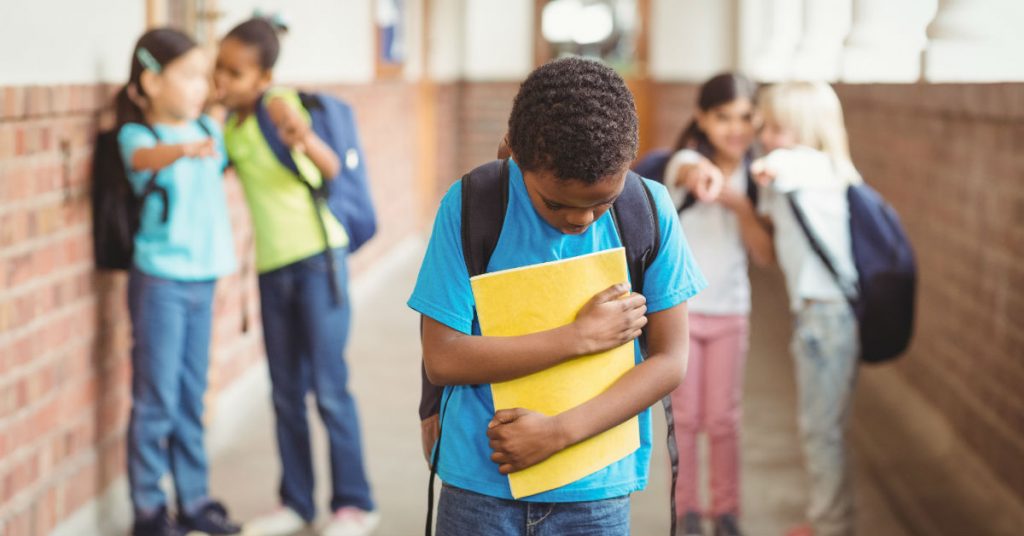
Anyone who has been the victim of bullying can tell you the detrimental impact it can play in your life. If you have children it is imperative that you familiarize yourself with the signs of bullying so you will be able to recognize the struggle before, during, or after the fact. By recognizing the signs you will also be better prepared to know how to help your child in each stage.
Before
While no parent wants their child to be a victim of bullying, the sad truth is that around 160,000 children skip school each day to avoid insult, attack or intimidation from bullies. If this bullying is not stopped immediately it can lead to a lifetime of consequences including the following:
- Low Academic Achievement
- Depression
- Anxiety
- Lack of Sleep
- Other Health Complaints
- Suicide
In an attempt to avoid these negative effects, one of the most important things you can do as a parent is to take preventative measure to ensure this never happens. Sit down with your child and have an honest conversation with them about bullies. Discuss how a bully might act and make sure they contribute to this description. Stress to your child that there are various forms of bullying.
Different Forms of Bullying
- Social/Relational Bullying– This consists of the bully doing everything within their power to exclude the victim from social circles, such as spreading rumors or telling others not to be friends with them.
- Cyber Bullying– This form of bullying includes sending mean texts, saying anything mean on social media outlets, and any other kind of victimization on the internet.
- Verbal Bullying– This type of bullying consists mostly of name calling, threats, teasing, and any other type of hurtful comment.
- Physical– Stealing, pushing, shoving, tripping, hitting, breaking things, are all signs of physical bullying.
By ensuring that your child is familiar with each form of bullying, they will be able to immediately recognize and come to you if they ever find they are the victim of bullying. It is imperative that you stress to your child the need for them to come to you immediately if they ever feel victimized in any way. The fastest way for bullying to stop is when the victim quickly tells a trusted adult of the problem, unfortunately too often those being abused are too nervous, scared, shy, or ashamed to tell someone. By having a conversation with your child before bullying is ever a problem and expressing the importance of them turning to you, you will establish a trust with your child that they will be able to rely on.
During
If you fear that your child is being bullied, there are many signs that you can look for to help you find out, here are just a few:
- They’re afraid of being left alone and want you there at the school’s dismissal.
- You find unaccounted for scratches, bruises, or scrapes on them.
- Their personal items, such as toys, electronics, school supplies, etc. suddenly go missing.
- They don’t want to ride the bus.
- Their grades start to drop.
- They don’t enjoy doing the same things that they used to.
- They have difficulty sleeping and may start wetting the bed.
- They seem moody and upset for no reason.
- They start bullying younger siblings.
- They don’t talk about their friends.
While there other indicators, this will give you a good basis to determine if your child is getting bullied. Once you’ve noticed one or more of these signs you need to immediately take action. Voice these concerns to your child and then watch their response, if they suddenly become withdrawn, silent, or won’t look you in the eyes, there is a good chance that your child is getting bullied. You may wonder why your child wouldn’t choose to come to you immediately after being bullied, below we’ve listed nine reasons why.
Why Victims of Bullying Don’t Always Tell
- They are Embarrassed or Ashamed– oftentimes bullies are able to highlight an insecurity and the victim is too embarrassed to tell an adult in fear that their insecurity will be further scrutinized so instead they continue to tolerate being bullied.
- They Fear How the Bully Might Retaliate– victims of bullying are often afraid of making it even worse by telling on the bully and then dealing with their wrath afterward, so they keep quiet instead.
- Social Pressure- Sometimes victims of bullying feel like they have to endure it in order to keep their social standing.
- They Feel No One Will Believe Them- Bullies like to target those that are known for being storytellers, that way the victim feels like there is no point in telling an adult because they won’t believe them.
- They Feel Like They Deserve the Abuse- children are very aware of their short-comings and when a bully makes fun of those insecurities, the victim may feel like they deserve the treatment.
- They Don’t Want to Be Called a Tattletale- When a child is already getting bullied, the last thing they want to do is add to that torment by being called names for telling an adult.
- They Don’t Consider It Bullying- Many children only recognize physical abuse as bullying, so are ignorant to tell an adult when they are faced with the other forms of bullying.
- They Feel Like They Will Be Expected to Deal With it Alone- A lot of victims of bullying don’t tell because they feel like they should be strong enough to handle it on their own.
- They Don’t Want to Lose Access to Electronics- In the case of cyber bullying, many children fear that if they tell their parents that they will lose access to their electronic devices.
After
Once you’ve discovered that your child is being bullied there are number of things you can do to help it get resolved quickly.
- Discover where the bullying took place, if it occurred on school grounds contact the principal, otherwise the police.
- Write down every occurrence between the bully and your child, outlining the details. Document everything!
- You are your child’s advocate, so make sure you tell their story.
- Obtain a copy of the school’s anti-bullying policy to see if the bully broke a policy.
- Ask what the principal will do to stop the problem.
- Follow-up by sending the principal a letter, highlighting all that will be done to ensure this treatment stops immediately.
Don’t approach the bully’s parents and try to resolve the issue by yourself. Parents don’t react well to being told that their children are behaving inappropriately, so the issue needs to be resolved by a neutral third party like a police officer or principal. After you’ve gone through these steps, don’t assume that the problem will go away overnight. Stress to your child that you are always available to them and that you will believe them no matter what. When it comes to the happiness and well being of your child, you must do all that you can to make sure they feel safe and loved.










Speak Your Mind